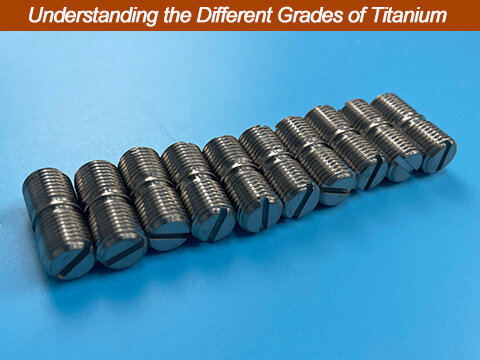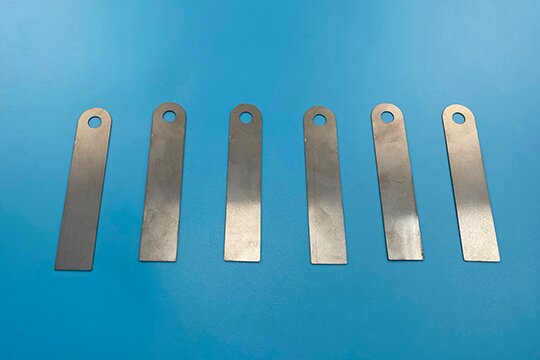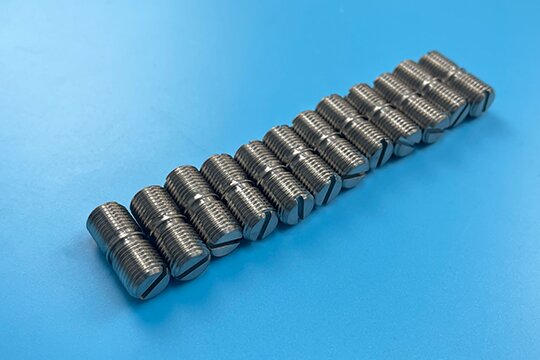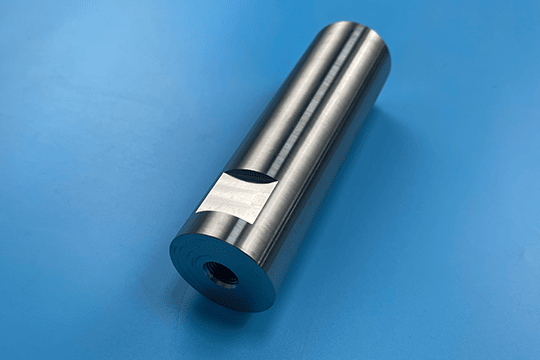Understanding the Different Grades of Titanium
views, Updated: November 14, 2025 by aemmetal

Introduction
Titanium is a popular metal because it's strong, lightweight, and resists corrosion. These qualities make it useful in many industries, such as aerospace, medical devices, marine, and chemical processing. As technology advances, the need for materials that can perform well under extreme conditions grows, and titanium is a top choice.
However, not all titanium is the same. There are different grades of titanium, each with specific properties for various uses. Knowing these grades is important for engineers, designers, and manufacturers to get the best performance from their products. Choosing the right grade of titanium can make a big difference in how well a product works.
In this blog, we will look at the different grades of titanium, their properties, benefits, and common applications. Whether you are in aerospace, medical device manufacturing, or any field that uses high-performance materials, understanding titanium grades will help you make better decisions. Let's explore the world of titanium grades and see what makes each one special and useful.
What Are Titanium Grades?
Titanium grades are different types of titanium categorized by their chemical composition and mechanical properties. These grades help determine which type of titanium is best suited for specific applications. The classification system is mainly defined by the American Society for Testing and Materials (ASTM), which provides detailed specifications for each grade.
The most commonly used titanium grades include:
-
Grade 1: Commercially pure titanium with excellent ductility and corrosion resistance but lower strength.
-
Grade 2: Similar to Grade 1 but with slightly higher strength and similar corrosion resistance. Often called the "workhorse" of titanium grades.
-
Grade 3: Higher strength than Grades 1 and 2, with good corrosion resistance and moderate ductility.
-
Grade 4: The strongest of the commercially pure titanium grades, with excellent corrosion resistance but lower ductility.
-
Grade 5 (Ti-6Al-4V): The most widely used titanium alloy, known for its high strength, good corrosion resistance, and excellent weldability.
Titanium Grade 1: Commercially Pure Titanium
Titanium Grade 1 is the purest and softest of all titanium grades. It is known for its excellent corrosion resistance, high ductility (the ability to be stretched or formed without breaking), and good impact toughness. These properties make it suitable for a variety of applications.

Characteristics of Grade 1 Titanium
High Ductility:
Grade 1 titanium is very flexible and can be easily formed into different shapes. This makes it ideal for products that need to be bent or molded.
Excellent Corrosion Resistance:
This grade resists corrosion exceptionally well. It can withstand exposure to saltwater and various chemicals without deteriorating, making it perfect for harsh environments.
Low Strength:
Compared to other titanium grades, Grade 1 has lower strength. It is not the best choice for applications that require high mechanical strength.
Biocompatibility:
Grade 1 titanium is safe for use in the human body. It doesn’t cause adverse reactions, making it suitable for medical implants and devices.
Advantages of Grade 1 Titanium
-
Ease of Fabrication: Grade 1 titanium is easy to work with, allowing for simple forming and welding.
-
Longevity: Its excellent corrosion resistance means products made from Grade 1 titanium last longer, reducing the need for maintenance and replacements.
-
Versatility: The combination of flexibility, corrosion resistance, and biocompatibility makes Grade 1 titanium useful in many different industries.
Common Applications of Grade 1 Titanium
Chemical Processing:
Grade 1 titanium is often used in chemical plants because it resists corrosion from harsh chemicals. It is used in equipment like heat exchangers, reaction vessels, and pipes.
Marine Environments:
Its ability to withstand seawater corrosion makes it ideal for marine applications. It is used in desalination plants, offshore oil rigs, and marine hardware.
Aerospace:
Although it is not as strong as other grades, Grade 1 titanium’s corrosion resistance and light weight make it useful in aerospace for components like airframe parts and ductwork.
Desalination Plants:
In these plants, Grade 1 titanium is used in evaporators and heat exchanger tubing because it can handle seawater without corroding or fouling.
Titanium Grade 2: The Workhorse
Titanium Grade 2 is one of the most commonly used grades of titanium. Known as the "workhorse" of the titanium industry, it offers a good balance of strength, ductility, and corrosion resistance. These properties make it a versatile material suitable for a wide range of applications.
Characteristics of Grade 2 Titanium
Moderate Strength:
Grade 2 titanium has higher strength than Grade 1, making it more suitable for applications that require a bit more durability.
Excellent Corrosion Resistance:
Like Grade 1, Grade 2 titanium resists corrosion in many environments, including seawater and various chemicals. This property ensures long-term performance and reliability.
Good Ductility:
While it is not as ductile as Grade 1, Grade 2 titanium can still be easily formed and shaped. It offers a good balance between strength and flexibility.
Good Weldability:
Grade 2 titanium is easy to weld, making it a convenient choice for manufacturing and fabrication processes.
Advantages of Grade 2 Titanium
-
Versatility: Grade 2 titanium's balance of strength, ductility, and corrosion resistance makes it suitable for a wide range of applications across various industries.
-
Cost-Effective: It offers a good combination of performance and cost, making it a practical choice for many applications.
-
Ease of Fabrication: Grade 2 titanium can be easily formed, welded, and machined, which simplifies the manufacturing process.
Common Applications of Grade 2 Titanium
Aerospace:
Grade 2 titanium is used in the aerospace industry for airframe components, ductwork, and other structural parts. Its strength and corrosion resistance are valuable for aircraft that must endure various environmental conditions.
Chemical Processing:
The chemical industry uses Grade 2 titanium for equipment that must withstand corrosive chemicals. This includes heat exchangers, tanks, and piping systems.
Marine Environments:
Grade 2 titanium is ideal for marine applications due to its resistance to seawater corrosion. It is used in boat hulls, propeller shafts, and underwater connectors.
Desalination Plants:
In desalination plants, Grade 2 titanium is used in heat exchangers and evaporator tubing. Its resistance to saltwater ensures durability and efficiency.
Titanium Grade 3: High Strength
Titanium Grade 3 is known for its high strength compared to Grades 1 and 2. It is also flexible and resists corrosion very well. These qualities make it great for applications needing a strong material without losing flexibility and corrosion resistance.

Characteristics of Grade 3 Titanium
High Strength:
Grade 3 titanium is much stronger than Grades 1 and 2. This makes it suitable for uses where durability and toughness are important.
Good Flexibility:
Even though it is strong, Grade 3 titanium can still be easily shaped and formed, making it versatile.
Excellent Corrosion Resistance:
Like other titanium grades, Grade 3 resists corrosion in various environments, including seawater and harsh chemicals.
Good Weldability:
Grade 3 titanium can be welded easily, which is important for many manufacturing processes.
Advantages of Grade 3 Titanium
-
Enhanced Strength: Its high strength means Grade 3 titanium is very durable and performs well in demanding situations.
-
Versatility: The mix of strength, flexibility, and corrosion resistance makes it useful in many different industries.
-
Durability: Its excellent corrosion resistance means that components made from Grade 3 titanium last a long time, reducing the need for maintenance and replacements.
Common Applications of Grade 3 Titanium
Aerospace:
Grade 3 titanium is used in aerospace for parts like airframes and landing gear because it is strong and lightweight.
Marine Environments:
Its excellent resistance to seawater corrosion makes Grade 3 titanium ideal for shipbuilding, offshore oil platforms, and underwater components.
Chemical Processing:
Grade 3 titanium is used in the chemical industry for equipment like tanks, pipes, and heat exchangers that need to withstand harsh chemicals.
Medical Devices:
Though not as common as Grades 1 and 2, Grade 3 titanium’s strength and corrosion resistance make it suitable for some medical devices and implants.
Industrial Applications:
Grade 3 titanium is used in various industries for parts in automotive, power generation, and industrial machinery where strength and corrosion resistance are needed.
Titanium Grade 4: The Strongest Commercially Pure Titanium
Titanium Grade 4 stands out as the strongest among commercially pure titanium grades. It offers excellent strength and good resistance to corrosion, making it ideal for tough applications where reliability is crucial.
Characteristics of Grade 4 Titanium
High Strength:
Grade 4 titanium is the strongest of all commercially pure titanium grades. It provides great strength for its weight, which is important in demanding uses.
Good Corrosion Resistance:
Like other pure titanium grades, Grade 4 resists corrosion well in various environments, including in seawater and chemicals.
Moderate Flexibility:
While not as easy to shape as Grades 1 and 2, Grade 4 titanium is still flexible enough for forming into different shapes.
Weldability:
It can be welded easily using standard methods, which is essential for making complex parts and structures.
Advantages of Grade 4 Titanium
-
Exceptional Strength: Grade 4 titanium offers the highest strength among commercially pure titanium grades, ensuring strong performance in tough conditions.
-
Corrosion Resistance: Its ability to resist corrosion helps parts made from Grade 4 titanium last longer, reducing maintenance needs.
-
Reliability: With its combination of strength, corrosion resistance, and weldability, Grade 4 titanium is reliable for various industrial uses.
Common Applications of Grade 4 Titanium
Aerospace:
Used in aerospace for strong parts like aircraft components, engine pieces, and structural parts that need to handle high stress.
Chemical Processing:
Grade 4 titanium is found in chemical plants for equipment such as pumps, valves, and reactors that must withstand harsh chemicals.
Marine Environments:
Its ability to resist corrosion in seawater makes Grade 4 titanium useful for marine applications like propeller shafts, fasteners, and underwater structures.
Medical Implants:
While less common than Grades 1 and 2, Grade 4 titanium is used in medical implants like orthopedic devices and bone screws due to its strength and biocompatibility.
Power Generation:
In power plants, Grade 4 titanium is used in parts like heat exchangers and turbine blades that need strength and resistance to corrosion.
Titanium Grade 5 (Ti-6Al-4V): The Titanium Alloy Standard
Titanium Grade 5, also known as Ti-6Al-4V, is the most widely used titanium alloy. It combines titanium with aluminum and vanadium to make it stronger and more versatile than pure titanium grades. This alloy is known for its strength, lightweight nature, and resistance to corrosion, making it suitable for many different uses.

Characteristics of Grade 5 Titanium (Ti-6Al-4V)
High Strength:
Ti-6Al-4V is very strong, comparable to some types of steel, but much lighter. This makes it ideal for applications where strength is important, but weight needs to be minimized.
Good Corrosion Resistance:
It holds up well against corrosion in various environments, including seawater and chemicals. This durability ensures it lasts a long time even in tough conditions.
Lightweight:
Despite being strong, Ti-6Al-4V is lightweight. This makes it perfect for industries like aerospace, where reducing weight is crucial for fuel efficiency and performance.
Can Handle High Temperatures:
It remains strong even when exposed to high temperatures, making it useful in environments where heat is a factor.
Advantages of Grade 5 Titanium (Ti-6Al-4V)
-
Strong and Light: Offers impressive strength while being lighter than many other metals, which is beneficial for many applications.
-
Resistant to Rust: Holds up well against rust and corrosion, which means less maintenance and longer-lasting parts.
-
Safe for the Body: Biocompatible, making it safe for use in medical implants without causing health problems.
-
Versatile: Useful in many industries due to its mix of strength, lightweight, and corrosion resistance.
Common Uses of Grade 5 Titanium (Ti-6Al-4V)
Aerospace:
Used extensively in aircraft parts like structures, engines, and landing gear due to its strength and lightweight properties.
Medical Implants:
It's biocompatible, meaning it works well inside the body without causing harm. Used for implants like joint replacements and dental implants.
Automotive:
Found in high-performance car parts such as exhaust systems and suspension springs to improve performance and reduce weight.
Marine:
Resists corrosion in saltwater environments, so it's used for boat parts like frames and propeller shafts.
Sports Equipment:
Used in sporting goods like bicycle frames, golf clubs, and tennis rackets because of its strength and light weight.
Choosing the Right Titanium Grade for Your Application
Selecting the appropriate titanium grade is crucial for ensuring optimal performance and longevity in your specific application. Each titanium grade offers unique properties that cater to different industrial needs and environmental conditions. Here’s a guide to help you choose the right titanium grade based on your requirements:
Factors to Consider
1. Strength Requirements:
-
High Strength: If your application requires high strength-to-weight ratio, consider titanium alloys like Grade 5 (Ti-6Al-4V) or Grade 9 (Ti-3Al-2.5V).
-
Moderate Strength: For applications needing moderate strength with good weldability, Grade 2 titanium is a reliable choice.
2. Corrosion Resistance:
-
Severe Environments: If your application will be exposed to corrosive environments such as seawater or chemical processing, consider titanium grades with enhanced corrosion resistance like Grade 7 (Ti-0.15Pd) or Grade 12 (Ti-0.3Mo-0.8Ni).
3. Lightweight Properties:
-
Aerospace and Automotive: For applications where reducing weight is critical without compromising strength, Grade 5 (Ti-6Al-4V) and Grade 9 (Ti-3Al-2.5V) are excellent choices due to their lightweight nature.
4. Biocompatibility:
-
Medical and Dental: If your application involves medical implants or devices, choose biocompatible titanium grades such as Grade 23 (Ti-6Al-4V ELI), which is Extra Low Interstitial and minimizes the risk of allergic reactions.
5. Temperature Resistance:
-
High-Temperature Applications: For applications requiring high-temperature stability, consider titanium alloys like Grade 5 (Ti-6Al-4V) that can withstand elevated temperatures up to 400-500°C (752-932°F).
6. Cost:
-
Cost-Effectiveness: Evaluate the cost of titanium grades relative to their performance characteristics. Pure titanium grades like Grade 2 tend to be more cost-effective compared to titanium alloys such as Grade 5 (Ti-6Al-4V), which may be more expensive due to alloying elements.
Choosing the right titanium grade involves balancing specific requirements such as strength, corrosion resistance, weight, biocompatibility, temperature stability, and cost-effectiveness. Understanding these factors enables you to select the optimal titanium alloy that enhances performance, durability, and reliability in your application. Whether for aerospace, medical, automotive, or industrial uses, each titanium grade offers distinct advantages that align with different operational demands and budget considerations.
Conclusion
Choosing the right titanium grade is essential for ensuring top performance and durability across different industries. Each titanium grade offers specific benefits that match various needs in aerospace, medical, automotive, and chemical processing applications.
At AEM Metal, we specialize in manufacturing and supplying high-quality titanium metal, including a variety of grades tailored to meet diverse industry requirements. Our commitment to excellence means every titanium product meets rigorous quality standards, ensuring reliability and performance in challenging environments.
Contact us today to learn how AEM Metal can meet your titanium material needs. Whether you need strong and lightweight alloys for aerospace, biocompatible grades for medical uses, or corrosion-resistant metals for industrial equipment, our expertise and product range are ready to support your projects.
Partner with AEM Metal for premium titanium solutions that elevate your performance and reliability.














